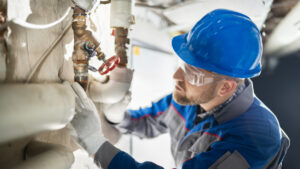Before you begin your AC installation:
- Make sure you measure the area to be cooled or heated.
- Obtain permission from your building management to install the AC unit.
- Make sure there is sufficient electrical service for the new unit.
- Make sure it has a dedicated electrical outlet.
- Ensure that the air conditioner is installed securely.
- Support the team underneath, or firmly fasten it from inside using metal brackets. You will need to contact the local government and fill out various applications.

Ensure that you choose an area away from gas, oil, and sulfur. The air conditioning system should be installed at least three feet from the studs. Avoid placing the air conditioner near power lines or antennas. You should also avoid installing the air conditioner near any gas leakage, oil mist, or sulfur. Once the AC installation is complete, clean up the area where the work was performed. Most of these air conditioners come with remote controls, so you can easily adjust the temperature from anywhere in the house.
Install the AC unit in the correct location. If the unit is installed in the window facing the street, it should be secured with a secure metal bracket. This way, it cannot fall out and cause an accident. The air conditioner owner is typically responsible for accidents caused by falling air conditioners. Building management will not be liable for such accidents. The air conditioner should be positioned in such a way as to allow for water drainage. You should also ensure that the window isn’t blocking an emergency exit window.
When choosing the location, consider aesthetics. Consider installing the air conditioner at different locations in the house to minimize its visual impact. An outdoor unit will make less noise than a house-sized one. Consider installing it on the shady side of the house. If aesthetics are not a concern, you can conceal it with landscaping or a concrete pad. However, make sure to consider air flow as well. You can also consider installing an air conditioner outdoors.
If you are unsure about installing an AC unit on your own, it is advisable to hire a professional service provider. In addition to obtaining proper permits, a professional company can also provide maintenance plans for new units. The installers of these HVAC units know the ins and outs of these units. They can also ensure safety and longevity. If you live in a rural area, it may be difficult to locate a professional to handle the installation.
In case you are replacing an existing AC unit, make sure the technician you hire is certified by the Environmental Protection Agency (EPA). While it may be cheaper to install a new AC unit yourself, you should always hire a licensed professional to ensure it is done right. Moreover, the installation of your AC unit may require a permit from your local government. Moreover, you should check for signs of malfunction and clogging of ductwork before hiring a professional.
When sizing an air conditioning unit, make sure to have the correct measurements for your home. Incorrect measurements may lead to an under or over-powered AC unit, so you must make sure you choose the correct size. To get the perfect air conditioner size, you must follow a series of smaller steps. Choosing the right size is the key to a successful AC installation. These steps are all handled by trained professionals. You may also need to connect your thermostat and electrical lines before the installation begins.
The Seasonal Energy Efficiency Ratio (SEER) of an air conditioner is important. The higher the SEER, the more efficient the system. For example, if the unit is capable of cooling a room with a lower temperature, it will cost less than a higher-SEER model. However, a higher SEER means a higher initial cost. The cost of a higher SEER will be offset by the energy savings.
Lastly, the price of your air conditioning system has to be considered carefully. There are several factors to consider, including the size of your house and the SEER rating of the air conditioner. A higher SEER rating means the AC is more efficient. Generally, a 14 SEER unit will cost between $3,000 and $6,000.

